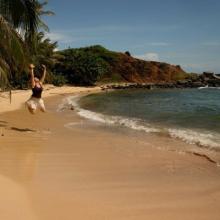Chelsey Hauge
Why did you decide to pursue a graduate degree?
I decided to pursue my PhD because, after experiences working with non profits and action oriented groups, I figured out that I am most passionate about research and theory. I am very excited about and interested in the ways in which transnational groups of youth move through and create media, and hope to continue to be involved with and work with global youth movements and media throughout my research career.
Why did you decide to study at UBC?
I came to UBC for several reasons. Primarily, there a number of senior scholars and other students working in similar areas with whom I can collaborate and learn who have interests similar to my own. This has been key to developing my ideas and identifying my own interests. Also, as a native Californian who was living in New York City, I was excited about being back on the beautiful West Coast!
What was the best surprise about UBC or life in Vancouver?
I was so surprised at the level of attention my committee, and other students in my research group, gave to my work! I've never had so much attention paid to my interests, and this has been a huge asset. It's such an honor to work with people who really pay attention to my work, and as a result can give really critical, fruitful and important feedback. I've also been pleasantly surprised by all the wonderful, dear friends I have made - people with whom I hope to be on this academic journey for many years to come,.
What do you hope to accomplish with your research?
With my research, I aim to achieve a better understanding of the ways in which mobility is constructed for youth in programs that explicitly work on themes of social change, justice, and development at the transnational level. I would like to understand how global and local flows shape the material practices of youth media producers, and the ways in which the mobilities of media producers are both fostered and constrained by the pedagogical practices of youth media organizations, producers, and communities.
What has winning a major award meant to you?
Winning the Vanier has really increased my confidence in my own work. It has also opened up a lot of possibilities and doors for me, and means that because I have the time and flexibility to truly focus only on my dissertation research and writing, I am able to produce higher quality work.
What advice do you have for new graduate students?
Get to know people! Join groups! Work on research projects! Attend talks! It's so easy to isolate yourself, and then you lose out on the riches that graduate school can offer. And, of course - say no to drama. For whatever reason, grad students seem to love drama, it's super easy to get caught up in, and your life is so much better without it.


